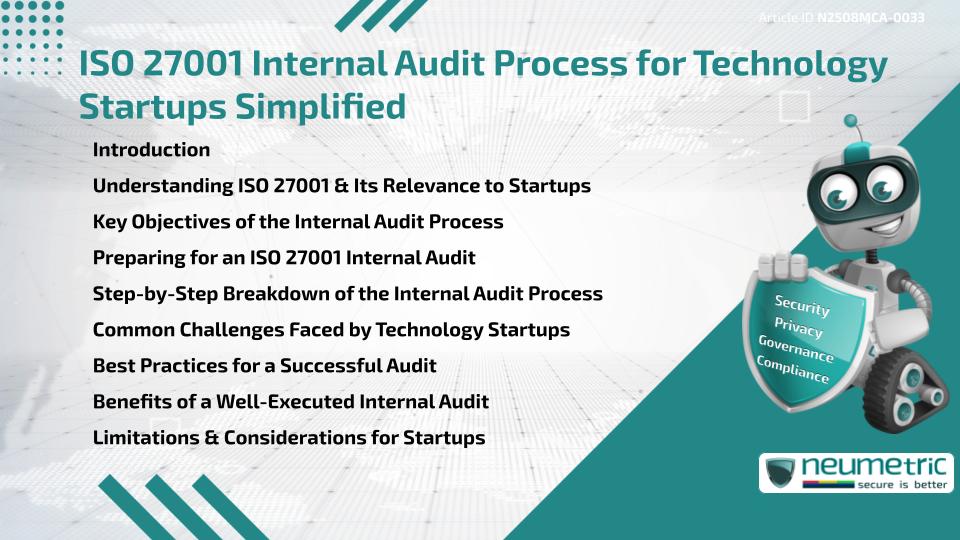Table of Contents
ToggleIntroduction
The ISO 27001 Internal Audit process for technology startups ensures that Information Security practices align with the ISO 27001 Standard while supporting business growth & compliance. This process involves evaluating Policies, procedures & controls to identify gaps, improve Security Measures & maintain readiness for external Certification Audits. For startups, it helps prevent Data Breaches, boosts Client trust & demonstrates commitment to safeguarding Information. By following a structured Audit process, startups can streamline compliance, reduce Risk exposure & strengthen operational resilience.
Understanding ISO 27001 & Its Relevance to Startups
ISO 27001 is an internationally recognised Standard for Information Security Management Systems [ISMS]. For technology startups, it offers a Framework to protect Sensitive Data, comply with legal requirements & meet Client expectations. Unlike large Corporations with dedicated compliance teams, startups often face resource constraints, making a clear Audit process essential. This Standard is not just about Security-it builds trust with Investors & Customers, especially in competitive markets.
Key Objectives of the Internal Audit Process
The primary goals of the ISO 27001 Internal Audit process for technology startups include:
- Ensuring ISMS controls meet ISO 27001 requirements
- Identifying nonconformities before an External Audit
- Verifying Risk Assessments are up to date
- Improving efficiency of Security procedures
- Enhancing overall compliance posture
These objectives help a startup maintain both Security & credibility while keeping costs in check.
Preparing for an ISO 27001 Internal Audit
Preparation starts with understanding the scope of the ISMS-what systems, processes & locations are covered. The next step is appointing a competent Auditor, either internal or external, who is independent from the activities being audited. Gathering necessary documents, such as the Statement of Applicability, Risk Treatment Plans & previous Audit Reports, is crucial.
Step-by-Step Breakdown of the Internal Audit Process
A typical Internal Audit process for technology startups follows these steps:
- Audit Planning – Define scope, criteria & schedule.
- Document Review – Assess Policies & procedures for compliance.
- Fieldwork – Conduct interviews, observe processes & test controls.
- Evidence Analysis – Compare findings against ISO 27001 requirements.
- Reporting – Document nonconformities, observations & improvement opportunities.
- Follow-up Actions – Implement corrective measures & track progress.
The structure ensures that nothing is overlooked, reducing the chance of surprises during external Certification Audits.
Common Challenges Faced by Technology Startups
Startups often face issues such as:
- Limited personnel with Audit expertise
- Rapidly changing Technology environments
- Balancing Security with Product Development speed
- Lack of documented procedures
Addressing these challenges requires a proactive approach, such as training team members & automating evidence collection.
Best Practices for a Successful Audit
To optimise the ISO 27001 Internal Audit process for technology startups:
- Schedule Audits early to allow time for remediation
- Use independent Auditors for impartial results
- Keep detailed records of Security activities
- Involve multiple Departments to ensure coverage
- Conduct mock Audits for practice
Benefits of a Well-Executed Internal Audit
A thorough Audit provides:
- Early detection of Security weaknesses
- Better preparation for external Certification
- Increased Client confidence
- Reduced Risk of Regulatory penalties
- Enhanced internal communication about Security priorities
These benefits directly contribute to long-term Business stability.
Limitations & Considerations for Startups
While beneficial, the ISO 27001 Internal Audit process for technology startups has limits. It can be time-consuming, especially for small teams. Also, Audit Findings require Management commitment to implement changes. Without follow-up, the benefits can be short-lived. Recognising these limitations helps set realistic expectations.
Takeaways
- ISO 27001 sets a clear Standard for securing Information in startups.
- Internal Audits identify & fix gaps before Certification.
- Preparation & planning are key to efficiency.
- Best Practices improve Audit outcomes & reduce Risks.
- Awareness of limitations ensures realistic planning.
FAQ
What is the purpose of the ISO 27001 Internal Audit process for technology startups?
It ensures that a startup’s ISMS meets ISO 27001 requirements, identifies issues before Certification & strengthens Information Security.
Can a startup perform the Audit internally?
Yes, provided the Auditor is independent from the audited activities & trained in ISO 27001 requirements.
What documents are needed for an Internal Audit?
Key documents include the Statement of Applicability, Risk Assessment Reports, Security Policies & previous Audit Reports.
How long does the Audit process take for startups?
It can take from a few days to a couple of weeks, depending on the scope & complexity of the ISMS.
Is an Internal Audit required for ISO 27001 Certification?
Yes, it is a mandatory requirement before undergoing an external Certification Audit.
What happens after the Internal Audit?
The startup must address nonconformities, implement Corrective Actions & document improvements for Review.
Need help for Security, Privacy, Governance & VAPT?
Neumetric provides organisations the necessary help to achieve their Cybersecurity, Compliance, Governance, Privacy, Certifications & Pentesting needs.
Organisations & Businesses, specifically those which provide SaaS & AI Solutions in the Fintech, BFSI & other regulated sectors, usually need a Cybersecurity Partner for meeting & maintaining the ongoing Security & Privacy needs & requirements of their Enterprise Clients & Privacy conscious Customers.
SOC 2, ISO 27001, ISO 42001, NIST, HIPAA, HECVAT, EU GDPR are some of the Frameworks that are served by Fusion – a SaaS, multimodular, multitenant, centralised, automated, Cybersecurity & Compliance Management system.
Neumetric also provides Expert Services for technical security which covers VAPT for Web Applications, APIs, iOS & Android Mobile Apps, Security Testing for AWS & other Cloud Environments & Cloud Infrastructure & other similar scopes.
Reach out to us by Email or filling out the Contact Form…


